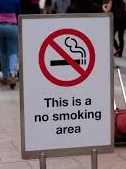Washington Smoking in Public Places law and Clark County Code Chapter 24.20
In 2005 the people of Washington State voted to expand the state Clean Indoor Air Act, now called Smoking in Public Places law, making all indoor public places and workplaces smoke free. The law prohibits smoking in any indoor enclosed public places. The law applies everywhere, all the time. The Smoking in Public Places law (RCW 70.160) is a state law that prohibits smoking in public places and workplaces to protect employees and the public from secondhand smoke.
However, the law does not include homes, apartments or other residential spaces. A useful resource for residential areas is "What You Can Do About Secondhand Smoke in Your Home: A Toolkit for Renters".
In April 2015, the Clark County Board of Health amended Clark County Ordinance 2015-04-18 which codifies the state Smoking in Public Places law and prohibits the use of inhalant delivery systems where smoking is prohibited by state law. The sole exception to the code is in stores that exclusively sell, market and/or distribute inhalant delivery systems. Sampling of inhalant delivery systems sold in these stores is permitted by persons age 18 and older.
Compliance with the Smoking in Public Places law and Clark County Code Chapter 24.20 is the responsibility of the owner, manager, operator, or another person in charge of an area open to the public or place of employment. Clark County Public Health will enforce the Smoking in Public Places law and Clark County Code 24.20 for businesses, including bars and restaurants. Local law enforcement agencies will maintain responsibility for individuals violating the law.
You can report smoking violations online describing the name and address of the business plus the time and a brief description of the violation.
If you observe a tobacco, vapor product or cannabis law/regulation violation, submit your report to the Washington State Liquor and Cannabis Board on this form.
Related information
- Smoking in Public Places law (RCW 70.160) (formerly the Clean Indoor Air Act)
- Clark County Code Chapter 24.20 Regulation of Smoking in Public Places and Inhalant Delivery Systems
- Reducing exposure to secondhand smoke Washington State Department of Health
- No Smoking, No Vaping sign
- Electronic Vapor Devices and Youth
- Seeing through the vapor
- Vapor devices
